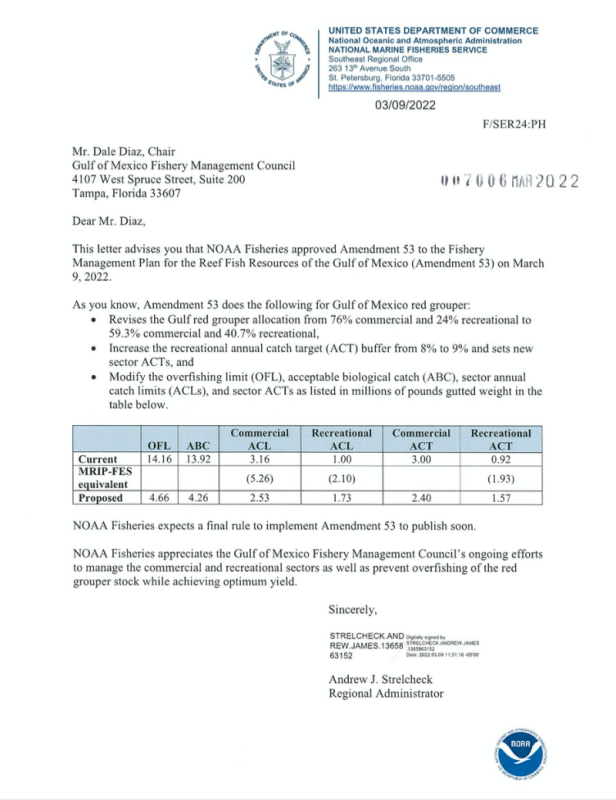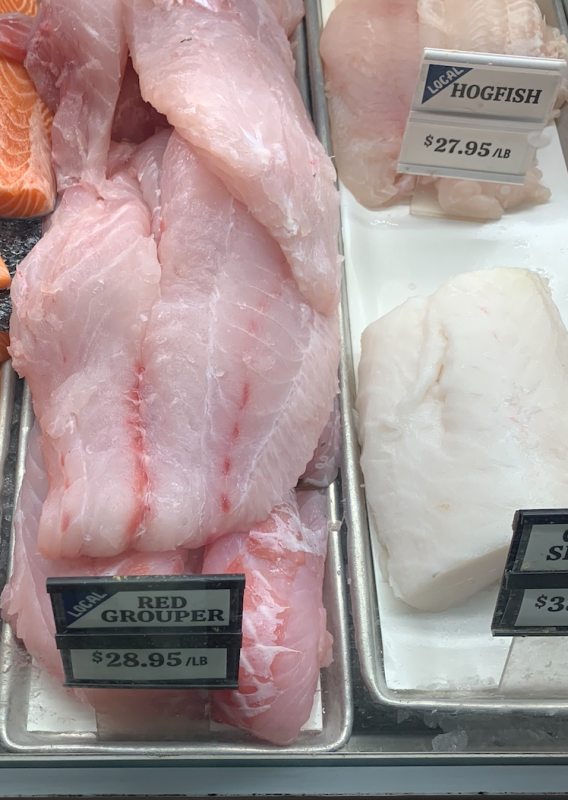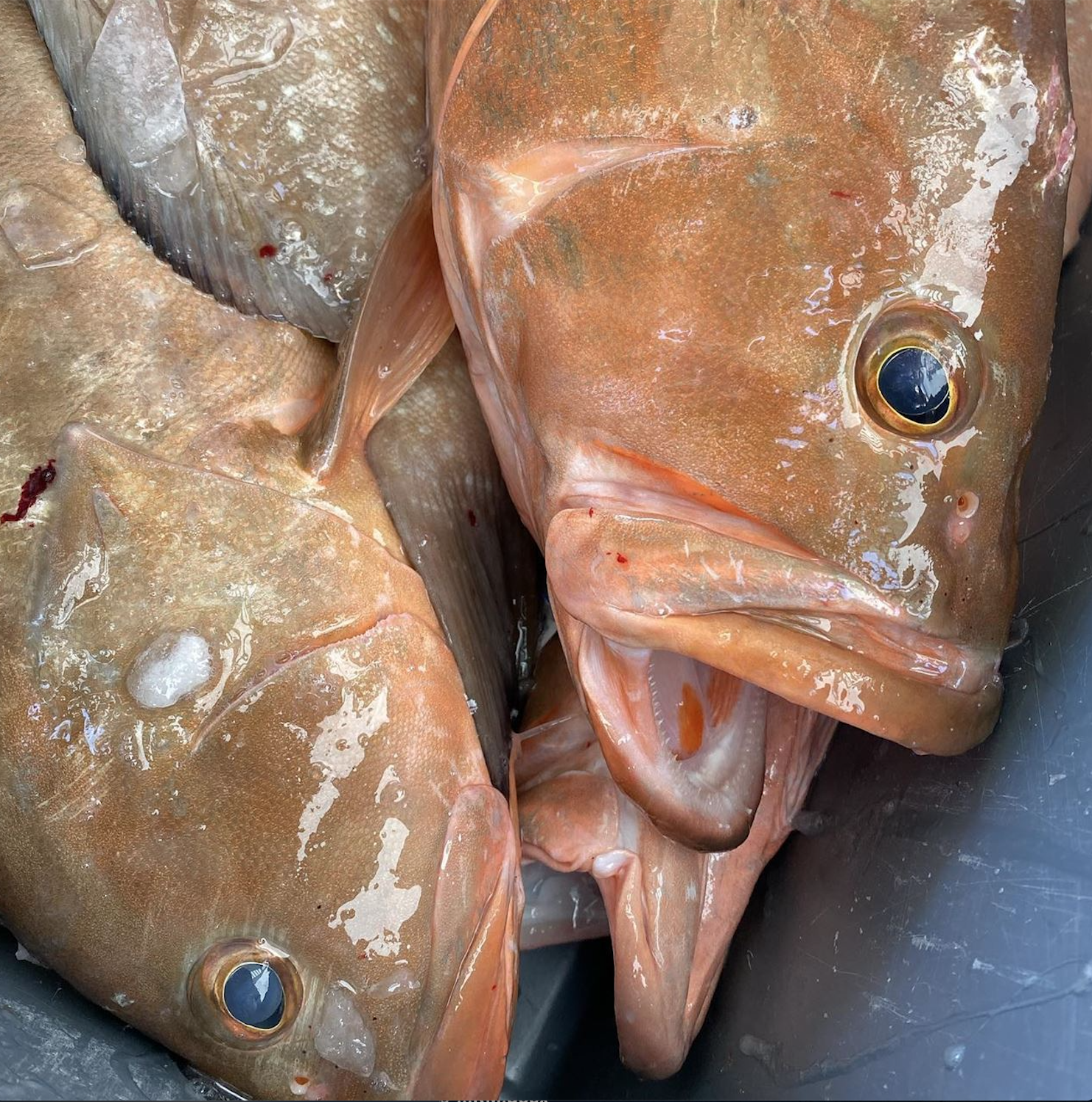A move to reallocate Gulf of Mexico red grouper has marshaled a broad coalition of fishing, seafood and food service industry groups asking federal officials to reconsider.
In a region where fishery politics are dominated by the recreational sector, commercial fishing advocates aided by allies in the restaurant and seafood industries mounted a big pushback on the planned Amendment 53 to the Gulf of Mexico Fishery Management Council reef fish management plan.
But in a March 9 letter, NMFS regional administrator Andrew Strelcheck advised the council that NMFS intends to approve the move.

In June 2021 the Gulf of Mexico council voted to change the recreational and commercial allocations of red grouper, based on recent changes to NMFS surveys of recreational fishing effort that showed the recreational side caught more fish during allocation reference years than had been estimated before.
The net effect would be to reduce the commercial sector’s allocation from 76 percent to 59.3 percent, while and increasing the recreational share from 24 percent to 40.7 percent, according to a Seafood Harvesters of America comment letter to NMFS.
“Effectively, this will result in a reduction of nearly one-third (32 percent) of the commercial sector’s allocation,” the group wrote.
NMFS public comment periods on the proposed change closed Feb. 18, and opponents poured in 2,850 comments against Amendment 53 – more than 99 percent of all comments, according to the Gulf of Mexico Reef Fish Shareholders’ Alliance.
The Marine Recreational Information Program changed in 2018 with the adoption of the Fishing Effort Survey, moving away from reliance on random landline telephone surveys to targeting on anglers with saltwater licenses.
“In Amendment 53, the basis of the reallocation is the use of a new methodology known as the MRIP-FES system,” the National Restaurant Association says in its comment letter. “However, questions remain about whether this new system improves the catch data programs currently managed by the Gulf states and how such a disproportionate result was achieved using the new methodology. Therefore, it is not resolved whether this system is considered the ‘best science’ to use as the basis for reallocation.”
Like all allocation battles, the red grouper debate has brought out competing narratives about the relative economic value of recreational versus commercially caught fish.
Restaurant and retail interests say the Gulf council failed to accurately assess the impact of reallocation. According to the restaurant association, one economic analysis shows “2020 landings of red grouper generated more than $187 million in foodservice and retail revenue.”

“It is our understanding that a formal allocation policy exists within the Gulf Council which works to address fisheries that may require a reallocation. This policy requires a full allocation review based on certain criteria,” the restaurant association wrote. “Under a full review, fishery resource managers would consider the interests of all stakeholders and make informed decisions regarding reallocation.
“We are concerned that the Gulf Council did not follow this policy in regard to Amendment 53 so the interests of all stakeholders, including restaurants and retail stores were not fully considered.”
“There were some pretty impressive organizations that were against the amendment,” the Reef Fish Shareholders Alliance noted in a bulletin to its members. “These included the National Restaurant Association, the National Fisheries Institute, the Florida Restaurant and Lodging Association, The (National) Food Industry Association, Seafood Harvesters of America, Southeastern Fisheries Association, Southern Offshore Fishing Association, Gulf Coast Seafood Alliance, National Association of Charterboat Operators, Gulf of Mexico Reef Fish Shareholders' Alliance, Fish for America USA, Southern Offshore Fishing Association, and the National Association of Charterboat Operators.”
In a Feb. 7 letter to the agency, the A.P. Bell Fish Company, Southern Offshore Fishing Association, and the Gulf of Mexico Reef Fish Shareholders’ Alliance asked NMFS to remand the amendment back to the council for a fuller review.
“Amendment 53 is unlawful and irrational. It would maximize bycatch of red grouper, minimize yields, increase management uncertainty and thus undermine conservation of the stock, and unfairly penalize commercial fishermen by taking away their quota to cover dead discards by recreational anglers,” wrote J. Timothy Hobbs, an attorney representing the commercial fishing groups.
Among their arguments, the objectors say Amendment 53 will worsen the problem of discards in the fishery
“Amendment 53 will exacerbate this problem because reallocating more quota to the recreational sector will dramatically increase dead discards,” wrote Hobbs. “Amendment 53 only looks at one side of the coin: it rewards the recreational sector for higher landings in the past, but does nothing to address the new information learned about higher discards that accompany those landings.”
After their push in the public comment process, commercial fishermen and their allies were waiting to see which way NMFS would go. The March 9 decision letter came a little earlier than they expected.
If the agency heeded objections and only gave partial approval to Amendment 53, it would have been kicked back to the Gulf council for reconsideration.
With NMFS' intent to approve the measure in full, opponents will have 30 days after the final rule is published to challenge it in federal court.







